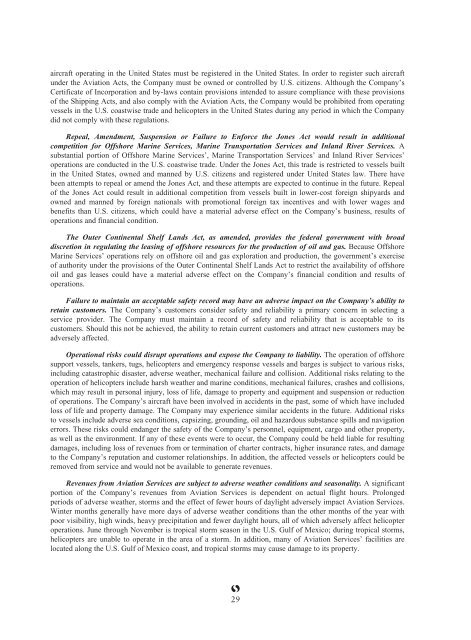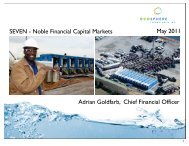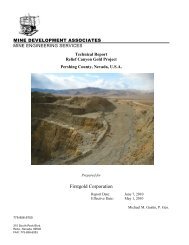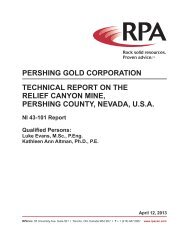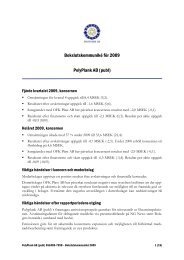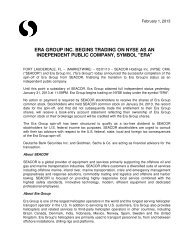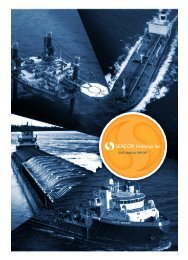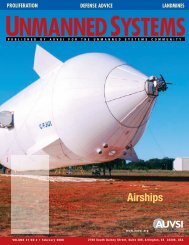You also want an ePaper? Increase the reach of your titles
YUMPU automatically turns print PDFs into web optimized ePapers that Google loves.
aircraft operat<strong>in</strong>g <strong>in</strong> the United States must be registered <strong>in</strong> the United States. In order to register such aircraft<br />
under the Aviation Acts, the Company must be owned or controlled by U.S. citizens. Although the Company’s<br />
Certificate of Incorporation and by-laws conta<strong>in</strong> provisions <strong>in</strong>tended to assure compliance with these provisions<br />
of the Shipp<strong>in</strong>g Acts, and also comply with the Aviation Acts, the Company would be prohibited from operat<strong>in</strong>g<br />
vessels <strong>in</strong> the U.S. coastwise trade and helicopters <strong>in</strong> the United States dur<strong>in</strong>g any period <strong>in</strong> which the Company<br />
did not comply with these regulations.<br />
Repeal, Amendment, Suspension or Failure to Enforce the Jones Act would result <strong>in</strong> additional<br />
competition for Offshore Mar<strong>in</strong>e Services, Mar<strong>in</strong>e Transportation Services and Inland River Services. A<br />
substantial portion of Offshore Mar<strong>in</strong>e Services’, Mar<strong>in</strong>e Transportation Services’ and Inland River Services’<br />
operations are conducted <strong>in</strong> the U.S. coastwise trade. Under the Jones Act, this trade is restricted to vessels built<br />
<strong>in</strong> the United States, owned and manned by U.S. citizens and registered under United States law. There have<br />
been attempts to repeal or amend the Jones Act, and these attempts are expected to cont<strong>in</strong>ue <strong>in</strong> the future. Repeal<br />
of the Jones Act could result <strong>in</strong> additional competition from vessels built <strong>in</strong> lower-cost foreign shipyards and<br />
owned and manned by foreign nationals with promotional foreign tax <strong>in</strong>centives and with lower wages and<br />
benefits than U.S. citizens, which could have a material adverse effect on the Company’s bus<strong>in</strong>ess, results of<br />
operations and f<strong>in</strong>ancial condition.<br />
The Outer Cont<strong>in</strong>ental Shelf Lands Act, as amended, provides the federal government with broad<br />
discretion <strong>in</strong> regulat<strong>in</strong>g the leas<strong>in</strong>g of offshore resources for the production of oil and gas. Because Offshore<br />
Mar<strong>in</strong>e Services’ operations rely on offshore oil and gas exploration and production, the government’s exercise<br />
of authority under the provisions of the Outer Cont<strong>in</strong>ental Shelf Lands Act to restrict the availability of offshore<br />
oil and gas leases could have a material adverse effect on the Company’s f<strong>in</strong>ancial condition and results of<br />
operations.<br />
Failure to ma<strong>in</strong>ta<strong>in</strong> an acceptable safety record may have an adverse impact on the Company’s ability to<br />
reta<strong>in</strong> customers. The Company’s customers consider safety and reliability a primary concern <strong>in</strong> select<strong>in</strong>g a<br />
service provider. The Company must ma<strong>in</strong>ta<strong>in</strong> a record of safety and reliability that is acceptable to its<br />
customers. Should this not be achieved, the ability to reta<strong>in</strong> current customers and attract new customers may be<br />
adversely affected.<br />
Operational risks could disrupt operations and expose the Company to liability. The operation of offshore<br />
support vessels, tankers, tugs, helicopters and emergency response vessels and barges is subject to various risks,<br />
<strong>in</strong>clud<strong>in</strong>g catastrophic disaster, adverse weather, mechanical failure and collision. Additional risks relat<strong>in</strong>g to the<br />
operation of helicopters <strong>in</strong>clude harsh weather and mar<strong>in</strong>e conditions, mechanical failures, crashes and collisions,<br />
which may result <strong>in</strong> personal <strong>in</strong>jury, loss of life, damage to property and equipment and suspension or reduction<br />
of operations. The Company’s aircraft have been <strong>in</strong>volved <strong>in</strong> accidents <strong>in</strong> the past, some of which have <strong>in</strong>cluded<br />
loss of life and property damage. The Company may experience similar accidents <strong>in</strong> the future. Additional risks<br />
to vessels <strong>in</strong>clude adverse sea conditions, capsiz<strong>in</strong>g, ground<strong>in</strong>g, oil and hazardous substance spills and navigation<br />
errors. These risks could endanger the safety of the Company’s personnel, equipment, cargo and other property,<br />
as well as the environment. If any of these events were to occur, the Company could be held liable for result<strong>in</strong>g<br />
damages, <strong>in</strong>clud<strong>in</strong>g loss of revenues from or term<strong>in</strong>ation of charter contracts, higher <strong>in</strong>surance rates, and damage<br />
to the Company’s reputation and customer relationships. In addition, the affected vessels or helicopters could be<br />
removed from service and would not be available to generate revenues.<br />
Revenues from Aviation Services are subject to adverse weather conditions and seasonality. A significant<br />
portion of the Company’s revenues from Aviation Services is dependent on actual flight hours. Prolonged<br />
periods of adverse weather, storms and the effect of fewer hours of daylight adversely impact Aviation Services.<br />
W<strong>in</strong>ter months generally have more days of adverse weather conditions than the other months of the year with<br />
poor visibility, high w<strong>in</strong>ds, heavy precipitation and fewer daylight hours, all of which adversely affect helicopter<br />
operations. June through November is tropical storm season <strong>in</strong> the U.S. Gulf of Mexico; dur<strong>in</strong>g tropical storms,<br />
helicopters are unable to operate <strong>in</strong> the area of a storm. In addition, many of Aviation Services’ facilities are<br />
located along the U.S. Gulf of Mexico coast, and tropical storms may cause damage to its property.<br />
29<br />
29


